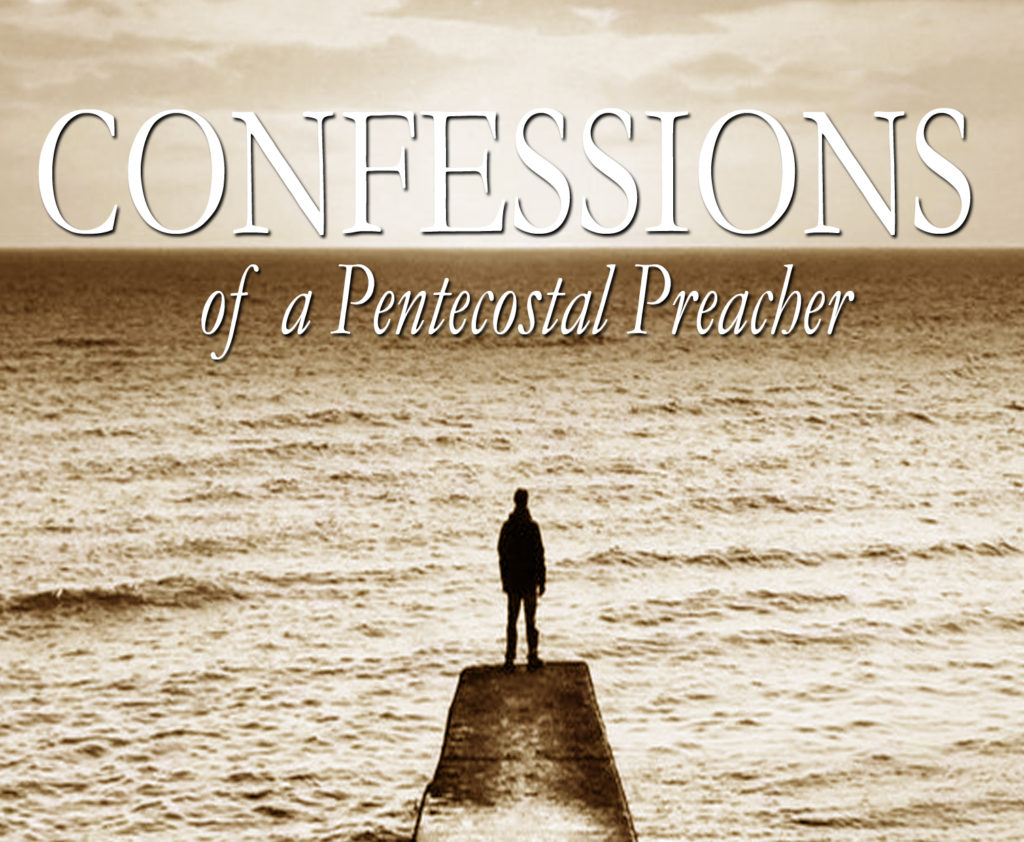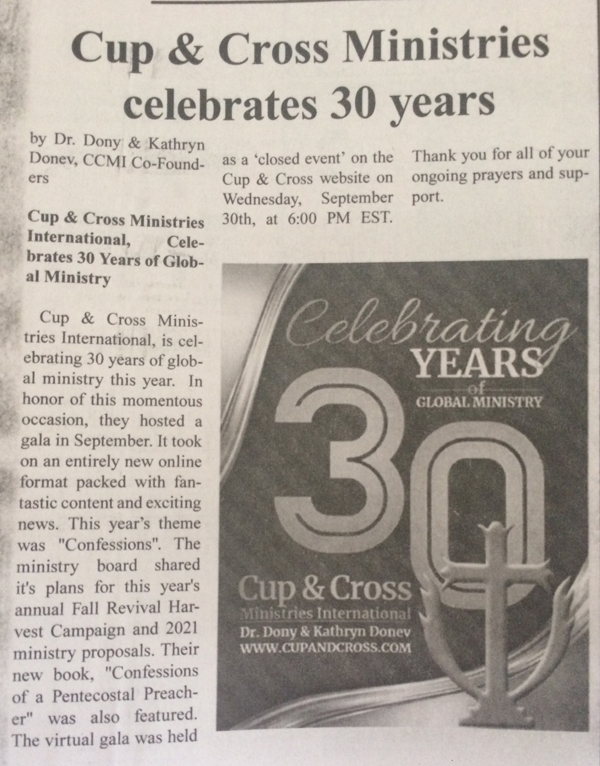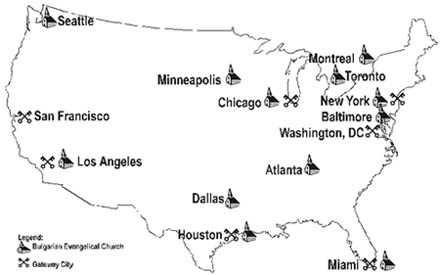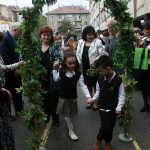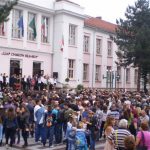30 Years of Miracles: 2006

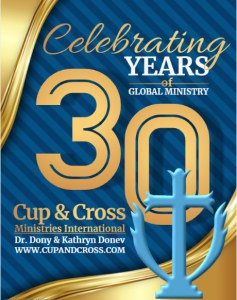 2006: The Year of Promise (January 7, 2006)
2006: The Year of Promise (January 7, 2006)
As last April in 2005 approached, we already knew that our presence in Bulgaria was needed and quickly prepared for our return. The days of ministry which followed upon our arrival in the country could have only been characterized as a miracle. As we continued to follow the leadership of the Holy Spirit, new doors for ministry were opened, new relationships were established and revival was revealed to the hearts of many Bulgarians as the new-yet-old paradigm for church ministry and personal growth. While watching how at times hundreds of lives were being touched by His move, our understanding of God and His power, our way of doing ministry and theology and our very lives and souls were slowly transformed to accommodate God’s heart for national revival emerging from supernatural individual restoration.
Ministering in Bulgaria (April 30, 2006)
With a desire to return back to Bulgaria for another term of ministry, we did not know when or how it would come to be. After much prayer and belief that 2006 is our year of promise, we took a step of faith to do what seamed to be impossible and began to prepare for our trip to Bulgaria. After taking this step, miracle after miracle took place in our lives. The first was the fact that we were able to get airline tickets less than a month before leaving that were cheaper than if we would have gotten them months in advance. Upon our arrival we again were blessed with someone to pick us up from the airport and take us to our final destination of Yambol. Though after arriving in Yambol we did not stay there long, for our schedule for the end of March and the coming month of April were already full.
Ministering in Samokov (May 22, 2006)
This past Sunday the miracle occurred again. Led by the Holy Spirit we found ourselves in Samokov ministering to the same Church of God congregation there. We preached and prayed with the congregation and were to meet again with several old acquaintances. A citywide evangelization meeting in cooperation with the Assemblies of God Church was held in the center of town that same evening. Over three thousand were in attendance. We are already planning our next return to the city of Samokov to hold a regional youth conference there.
Ministering in Bulgaria (June 27, 2006)
An elderly lady testified that in our service in Yambol last month, the sharp pain in her heart disappeared and she has not felt it since. Many more testified of miraculous healings and spoke of receiving a fresh touch from the Lord. In The Bourgas the family of a teenage boy on drugs was blessed through the miracle of his deliverance. The local church was able to participate in the process allocating resources to provide care for his recovery and spiritual growth.
Healing in the Midst of Revival (November 10, 2006)
After the Monday night service of the revival we held in Sofia, a lady came to us and testified of a healing in her left arm where she had been experiencing tremendous pain to the point of not being able to move it. She further reported that during the service the pain completely left her body. While in revival services in Bourgas a similar healing took place. In the middle of the alter call, an elderly lady testified with a shout and with her hands raise to the Lord in thanks for a physical healing. This lady testified that before the service she could not move her arm or leg on one side of her body and that during the time at the alter she received an instant healing in which she was able to walk without hindrance and could move her arm and open her crippled hand. We held a total 33 services in 24 days in Bulgaria during the month of October as part of our 2006 Revival Harvest Campaign. Many were touched and transformed by the power of God while ministering during two revivals and a number of regional meetings and youth rallies in major Bulgarian cities. On Monday night during our last revival before our departure which was held in the oldest Bulgarian Pentecostal church in the Black Sea port city of Bourgas, a lady received her miracle and was healed from cancer. The case was later confirmed by her doctor.
This book should have been published seven years ago in 2013. Its original subtitle was going to read “7 Years in Bulgaria.” Instead, it took seven years to finish it with all documents, research archives and new cases. Now, it is finally here and it finally reads like a story – not just choppy interviews, deposition documented testimonies or court records, but a story of struggle, strength and solitude. A story of life and a story of us.
1995-96 The establishing of the first Bulgarian Church of God in Chicago and its first split
2000-01 The contracted building of the ministry center for the Central Church of God in Sofia
2002-03 The church split in Southaven and what followed next
2005-06 The post-communist split of the Bulgarian Church of God and consecutive sub-denominations
2010-13 The social media network that cost us millions (of souls)
2016 The vote that forced to kill a church
2019-20 The sale of the ministry center for the Central Church of God in Bulgaria
READ: CONFESSIONS of a Pentecostal Preacher
CONFESSIONS of a Pentecostal Preacher
To Mark Alan
We know not why good people have to die,
but we do know we must tell their story…
Chapter I: Beyond the Church and into God
Be without fear in the face of your enemies.
Be brave and upright that God may love thee.
Speak the truth always, even if it leads to your death.
Safeguard the helpless and do no wrong.
That is your oath.
~Kingdom of Heaven (2005)
Separation of church from politics of false religiosity
The phone rang heavy and long. It was 4 AM in Bulgaria, but I was already up. A friend on the other end of the line was calling from South Carolina with a warning of some bad situation. The following morning, I was going to be contacted by the Director questioning why we were ministering in churches outside of our denomination.
The truth was we had ministered in some 300 local churches across the Balkan country of Bulgaria crossing all denominational boundaries and gathering youth from just about every confession. God had used us not only to reach and minister and to lead, but to step into an untouched spiritual realm, to undertake an unfamiliar ministry paradigm and to approach a brand new dimension of reality where He was to be the center of it all. And we had obeyed without questions. Now it was time to pay the price!
* * *
Our denomination, the one to which I remain both critically loyal and loyally critical, spreads over some five generations. Through its century old existence, the struggles and tension between theology and praxis has been in the center. And there, in the very essence of Pentecostalism itself, while some are always celebrating and being celebrated in the office or temple, others are always pushed in the periphery of normal life, hidden from the world behind closed doors and seeking a much deeper experience with God.
These modern day mystics are not only forgotten, but often forbidden. For their riot for righteousness cannot be conceived, contained and controlled by the religious norms of organized officiality. They speak as prophets to a world they so fervently try to escape from, about a reality that does not exist in the normal believer’s mindset. A stage of spirituality that cannot be preached without being lived in the social existence. And a relationship of God that goes far beyond common relationism and into God himself. That God, Who does not abide in offices and temples, but on the cross outside of the city walls…
But I knew nothing of this until that cold winter morning when the phone rang through darkness of the night. Knowing what is coming, rarely changes what we have done to get here.
7 Years in Bulgaria: CONFESSIONS of a Pentecostal Preacher
by Dony K. Donev, D.Min.
Upcoming Releases for United States (October, 2020)
30 Years of Miracles: 2005

 Is There Revival in Bulgaria? (August 30, 2005)
Is There Revival in Bulgaria? (August 30, 2005)
During the process of completing this article, “Verfolgte Christen” (“Persecuted Christians”) published a letter by pastor Vesselin Lazarov from Shumen, Bulgaria. He reported that a young man fell to the ground, dead at a Turkish wedding. People tried to resuscitate him, but without success. Then a church member prayed for him and called him back to life. As the man stood up, over 100 astonished eyewitnesses shouted “A miracle! A miracle!” These testimonies are only a few of over 600 cases of literal, physical resurrections, which have been documented in the past 15 years in Bulgaria. Virtually all of them have occurred in some relations to Bulgarian Protestant congregation(s) or minister(s). Is there revival in Bulgaria? I think this question has been already answered literally.
Mission BULGARIA 2005
In 2005, our team was successful in establishing several new congregations in Southern Bulgaria. The work was not without challenges from the particularity of the geographical location and the cultural setting which included: (1) ongoing migration of people between towns and villages, as well as internationally, (2) opposition from Eastern Orthodox priests and restrictions by local authorities (both described as illegal by the constitution) and (3) economical challenges and extreme poverty in the Bulgarian villages (especially through the winter periods). These factors often disable the local people and limit the ministry, as some of them are still ongoing and form the context in which the team ministers. Yet, Mission BULGARIA has been successful in establishing a growing number of new congregations and providing pastoral care for each of them every week. We were able to travel with the team every week and minister to the churches in the Yambol region and were encouraged by their testimonies of salvation, provision, healing and even bodily resurrection.
This book should have been published seven years ago in 2013. Its original subtitle was going to read “7 Years in Bulgaria.” Instead, it took seven years to finish it with all documents, research archives and new cases. Now, it is finally here and it finally reads like a story – not just choppy interviews, deposition documented testimonies or court records, but a story of struggle, strength and solitude. A story of life and a story of us.
1995-96 The establishing of the first Bulgarian Church of God in Chicago and its first split
2000-01 The contracted building of the ministry center for the Central Church of God in Sofia
2002-03 The church split in Southaven and what followed next
2005-06 The post-communist split of the Bulgarian Church of God and consecutive sub-denominations
2010-13 The social media network that cost us millions (of souls)
2016 The vote that forced to kill a church
2019-20 The sale of the ministry center for the Central Church of God in Bulgaria
READ: CONFESSIONS of a Pentecostal Preacher
CONFESSIONS of a Pentecostal Preacher
To Mark Alan
We know not why good people have to die,
but we do know we must tell their story…
Chapter I: Beyond the Church and into God
Be without fear in the face of your enemies.
Be brave and upright that God may love thee.
Speak the truth always, even if it leads to your death.
Safeguard the helpless and do no wrong.
That is your oath.
~Kingdom of Heaven (2005)
Separation of church from politics of false religiosity
The phone rang heavy and long. It was 4 AM in Bulgaria, but I was already up. A friend on the other end of the line was calling from South Carolina with a warning of some bad situation. The following morning, I was going to be contacted by the Director questioning why we were ministering in churches outside of our denomination.
The truth was we had ministered in some 300 local churches across the Balkan country of Bulgaria crossing all denominational boundaries and gathering youth from just about every confession. God had used us not only to reach and minister and to lead, but to step into an untouched spiritual realm, to undertake an unfamiliar ministry paradigm and to approach a brand new dimension of reality where He was to be the center of it all. And we had obeyed without questions. Now it was time to pay the price!
* * *
Our denomination, the one to which I remain both critically loyal and loyally critical, spreads over some five generations. Through its century old existence, the struggles and tension between theology and praxis has been in the center. And there, in the very essence of Pentecostalism itself, while some are always celebrating and being celebrated in the office or temple, others are always pushed in the periphery of normal life, hidden from the world behind closed doors and seeking a much deeper experience with God.
These modern day mystics are not only forgotten, but often forbidden. For their riot for righteousness cannot be conceived, contained and controlled by the religious norms of organized officiality. They speak as prophets to a world they so fervently try to escape from, about a reality that does not exist in the normal believer’s mindset. A stage of spirituality that cannot be preached without being lived in the social existence. And a relationship of God that goes far beyond common relationism and into God himself. That God, Who does not abide in offices and temples, but on the cross outside of the city walls…
But I knew nothing of this until that cold winter morning when the phone rang through darkness of the night. Knowing what is coming, rarely changes what we have done to get here.
7 Years in Bulgaria: CONFESSIONS of a Pentecostal Preacher
by Dony K. Donev, D.Min.
Upcoming Releases for United States (October, 2020)
30 Years of Miracles: 2004

 2004 Ministry Strategy (January 11, 2004)
2004 Ministry Strategy (January 11, 2004)
Recently, we held another training seminar for the Yambol region. More than 80 local church leaders joined together. Prayer clothes representing the needs of the sick were brought to the meeting, and our team had received a number of healings reports. Among them, Shtiliana Paskova from the village of Leyarovo was miraculously healed of a tumor the size of a tennis ball, which had been determined by doctors as cancerous. Also, Maria Miteva received a vision during the prayer for healing, that God was healing her. Immediately after the prayer she felt that the long-years of back pain for which no medicine had been able to help her had miraculously left.
Our active churches in 2004 (February 26, 2004)
Since September 1996, our work in Bulgaria has grown tremendously from two village churches to a Regional Pentecostal Fellowship of more than ten local congregations within the Church of God. As our team of eight ministers averages over 100 services per month, we are faithfully providing pastoral care for the following churches:
- Alexandrovo Church 45 miles away from Yambol has 10 members. Cup & Cross Ministry Team has held 1 service per week there since May, 2001.
- Bogorovo Church 38 miles away from Yambol has 30 members including the mayor. Cup & Cross Ministry Team has held 1 service per week there since October, 2000.
- Dobrinovo Church 42 miles away from Yambol has 30 members. Cup & Cross Ministry Team has held 3 services per week there since March, 2003.
- Iretchekovo Church 20 miles away from Yambol has 26 members. Cup & Cross Ministry Team has held 1 service per week there since January, 2003.
- Kamenetz Church 32 miles away from Yambolhas 50 members including the mayor. Cup & Cross Ministry Team has held 5 services per week there since February, 2000.
- Kozarevo Church 7 miles way from Yambolhas 58 members. Cup & Cross Ministry Team has held 1 service per week there since December, 2003.
- Leyarovo Church 38 miles away from Yambolhas 12 members including the mayor. Cup & Cross Ministry Team has held 2 services per week there since May, 2000.
- Lulin Church 28 miles away from Yambolhas 17 members including the mayor. Cup & Cross Ministry Team has held 2 services per week there since October, 2000.
- Parvenetz Church 35 miles away from Yambol has 6 members. Cup & Cross Ministry Team has held 1 service per week there since March, 2003.
- Polyana Church 52 miles away from Yambol has 60 members. Cup & Cross Ministry Team has held 2 services per week there since October, 1999.
- Robovo Church 38 miles away from Yambolhas 10 members. Cup & Cross Ministry Team has held 1 service per week there since May, 2000.
- Tamarino Church 30 miles away from Yambolhas 10 members. Cup & Cross Ministry Team has held 1 service per week there since December, 2002.
- Tchukarovo Church 52 miles away from Yambolhas 12 members including the mayor. Cup & Cross Ministry Team has held 2 services per week there since May, 2000.
- Vodenitchane Church 26 miles away from Yambol has 16 members. Cup & Cross Ministry Team has held 2 services per week there since January, 2003.
A MAN ALIVE (May 5, 2004)
The communion service our team held on the Thursday before Easter in the Kamenetz church lasted over five hours. Close to midnight, my mother and her team opened an altar service and prayed for the sick. One lady whose brother was deathly ill brought for prayer a tank top that belonged to her brother. They prayed for the healing of the man and laid hands on the tank top believing for a miracle. Unfortunately, several days later the man died in his home. The family brought a casket to the home and began preparing for the funeral. In the Bulgarian villages this is usually done in the house of the deceased. His sister wished to use the tank top as a part of his burial clothing. As the tank top touched his dead body, her brother came back to life. Afraid that he may get shocked at the view of the burial preparations and the casket, the family did not allow him to see it. Right now, the man is alive while the unused casket is locked in another room of the house. On Easter Sunday, Bulgarians greet each other with the greeting, “Christ is risen.” The response is, “He is risen indeed.” Having heard of the story of the resurrected man, the people from our churches and from the villages in the region have been greeting each other with the words, “Christ is risen and we are risen with Him!”
Over 100,000 Bulgarian Protestants (September 1, 2004)
For the past two years, along with regularly-held weekly services, the Cup & Cross team in Bulgaria has been working on a survey purposing to establish the geographical location and historical background of all Protestant churches in the Yambol region. We are happy to announce that the completion of this survey was marked with a healing crusade in the town of Sliven. Our team has traveled and introduced our ministry to every Protestant church in the Yambol region and has compiled a detailed analysis which will become a part of our ministry strategy.
A Weekend of Revival (September 17, 2004)
On Friday, September 17, 2004 a group with one vision gathered for prayer and fasting at the church in the village of Liulin. Each of the leaders brought five people from his or her local church to participate in the day of consecration before the Lord. The day finished with a powerful church service in the evening which continued with testimonies and praise. The group then traveled to the church in Kamenetz where they continued the fasting through Saturday and then held a healing service in the evening.
October Ministry Report (October 1, 2004)
In the month of September, Cup & Cross Ministries started a new service in the town of Zimnitza which is located northwest of Yambol. In the past, our team has held services and crusades in the area, however, the new weekly service is not alike any of them. The service is specifically designed for people with a terminal diagnosis. Since our ministry began holding healing services every week, the number of healing testimonies have grown significantly. This present endeavor has an evangelistic character and is organized exclusively by people who have been healed by God. The service purposes to create an environment in which people who have been healed minister to people who need healing. Here are the testimonies of the participants:
- Genka Z. from the village of Pollyana, 46 years of age and a member of the village ministry team presented a need for healing of her two baby grandchildren. They were sent home from the hospital with severe stomachaches after the doctors were unable to diagnose them. On October 22, 1999 our team prayed for two baby clothes which were brought to the children. Approximately two hours after the prayer, the pain disappeared and for the babies stopped crying. Last year, the children traveled with our team to a water baptism service and quoted psalms.
- The testimony of the grandmother Genka, however, is even greater. In 2000, at the age of 42, she was diagnosed with lung cancer. The Bourgas Oncology Hospital sent her home in April of 2000 with no hope. The church prayed for her and she is still living today.
- In 2001, a heavy roof collapsed on her. She spent the next six months in a cast with the left side of her body completely paralyzed, praying for healing and for the salvation of her family. The church prayed for her again and the Lord healed her. It was then that she opened her house for the prayer meetings each Monday and Thursday. Today her whole family including three daughters, three son-in-laws and three grandchildren are saved.
This book should have been published seven years ago in 2013. Its original subtitle was going to read “7 Years in Bulgaria.” Instead, it took seven years to finish it with all documents, research archives and new cases. Now, it is finally here and it finally reads like a story – not just choppy interviews, deposition documented testimonies or court records, but a story of struggle, strength and solitude. A story of life and a story of us.
1995-96 The establishing of the first Bulgarian Church of God in Chicago and its first split
2000-01 The contracted building of the ministry center for the Central Church of God in Sofia
2002-03 The church split in Southaven and what followed next
2005-06 The post-communist split of the Bulgarian Church of God and consecutive sub-denominations
2010-13 The social media network that cost us millions (of souls)
2016 The vote that forced to kill a church
2019-20 The sale of the ministry center for the Central Church of God in Bulgaria
READ: CONFESSIONS of a Pentecostal Preacher
CONFESSIONS of a Pentecostal Preacher
To Mark Alan
We know not why good people have to die,
but we do know we must tell their story…
Chapter I: Beyond the Church and into God
Be without fear in the face of your enemies.
Be brave and upright that God may love thee.
Speak the truth always, even if it leads to your death.
Safeguard the helpless and do no wrong.
That is your oath.
~Kingdom of Heaven (2005)
Separation of church from politics of false religiosity
The phone rang heavy and long. It was 4 AM in Bulgaria, but I was already up. A friend on the other end of the line was calling from South Carolina with a warning of some bad situation. The following morning, I was going to be contacted by the Director questioning why we were ministering in churches outside of our denomination.
The truth was we had ministered in some 300 local churches across the Balkan country of Bulgaria crossing all denominational boundaries and gathering youth from just about every confession. God had used us not only to reach and minister and to lead, but to step into an untouched spiritual realm, to undertake an unfamiliar ministry paradigm and to approach a brand new dimension of reality where He was to be the center of it all. And we had obeyed without questions. Now it was time to pay the price!
* * *
Our denomination, the one to which I remain both critically loyal and loyally critical, spreads over some five generations. Through its century old existence, the struggles and tension between theology and praxis has been in the center. And there, in the very essence of Pentecostalism itself, while some are always celebrating and being celebrated in the office or temple, others are always pushed in the periphery of normal life, hidden from the world behind closed doors and seeking a much deeper experience with God.
These modern day mystics are not only forgotten, but often forbidden. For their riot for righteousness cannot be conceived, contained and controlled by the religious norms of organized officiality. They speak as prophets to a world they so fervently try to escape from, about a reality that does not exist in the normal believer’s mindset. A stage of spirituality that cannot be preached without being lived in the social existence. And a relationship of God that goes far beyond common relationism and into God himself. That God, Who does not abide in offices and temples, but on the cross outside of the city walls…
But I knew nothing of this until that cold winter morning when the phone rang through darkness of the night. Knowing what is coming, rarely changes what we have done to get here.
7 Years in Bulgaria: CONFESSIONS of a Pentecostal Preacher
by Dony K. Donev, D.Min.
Upcoming Releases for United States (October, 2020)
30 Years of Miracles: 2003

 February Ministry Report (February 27, 2003)
February Ministry Report (February 27, 2003)
We held several training seminars as well as parallel prayer meetings. In the middle of the seminar on healing, a lady from one of the local churches stood and announced that she must leave the meeting because her husband who had a stroke was at home alone. Apparently, he was unable to move due to the stroke and needed her care. Her vocal announcement was the least to say discouraging for the healing hour of the seminar. However, the feeling of disappointment did not persist much longer. Several hours later as we were gathered in prayer, the same lady phoned the church where we were gathered to tell us that as she returned home from the meeting her husband had told her that he wants to get up and walk. She listened to him with disbelief since the doctors had said he may never walk again. That same day he slowly walked on his own around the house. The next day he was able to make several steps in the yard. God’s power followed his wife from the meetings to their house and healed him. The newer people who attended our meetings were strongly impressed by the numerous healings and the fact that none of the several hindered people who are members of our Christian movement is sick. Our prayers for healing are always supported by strong and continuous fasting. Now these newer people have began chain prayer and fasting in their villages and are constantly reporting of healings in their areas as well. Most of our recent meetings have turned to testimony services where people who have been sick just a week ago travel to our meetings to testify how God has healed them after the prayers of the Pentecostal Christians.
Second Regional Training Conference (March 30, 2003)
In our last report we shared with you that at the training conference in February 2003, in the middle of the seminar on healing, a lady from one of the local churches stood and announced that she must leave the meeting because her husband who had a stroke was at home alone. Apparently, he was unable to move due to the stroke and needed her care. Her vocal announcement was the least to say discouraging for the healing hour of the seminar. However, the feeling of disappointment did not persist much longer. Several hours later as we were gathered in prayer, that same lady phoned the church where we were gathered to tell us that as she returned home from the meeting her husband had told her that he wanted to get up and walk. She listened to him with disbelief since the doctors had said he may never walk again. That same day he slowly walked on his own around the house. The next day he was able to take several steps in the yard. God’s power followed his wife from the meetings to their house and healed him. This lady brought her husband with her to the training conference on Saturday March 15. They both sang songs which the Spirit has given them in the past several months through which the husband has been sick and testified about God’s mercy and healing power. After the seminar a 53 year old lady from the church in Polyana, where we have been struggling to purchase a building for a church for almost two years, reported that the Lord healed her at the conference. All her life she has had severe heart problems. For years she has taken heart medications and followed the advice of her family doctor. The night after the seminar she had a dream in which a team of doctors dressed in bright white clothes operated on her heart. She woke up in the middle of the night feeling that the heaviness in her chest had diapered. In the morning, she threw away all her medications as she felt no need to use them any longer. Several days later she went for her regular check up with the doctor who she had been seeing for the past 15 years, and who for years had been recommending her for surgery. After the checkup he told her that her heart seemed to be completely restored and fully functional. Being familiar with her medical history the doctor was amazed how such a thing may occur.
Easter in Bulgaria (May 11, 2003)
At the end of the Easter service we had a prayer for the sick. Several healings took place. A lady from the village with a severe lymph infection that had deformed her whole neck area was momentarily healed as the large nodes on her neck disappeared during the prayer and was witnessed by all present. The following Saturday, May 3, our team led the third Women of Godliness seminar this year organized in the Yambol area. The topics discuss were Mary Magdalene as the first witness of the resurrection and the women which Paul mentions in Romans chapter 16. We were unable to finish the second topic as the Holy Spirit gave a prophetic word to several ladies directing the seminar toward an all night prayer meeting. All through the night God dealt with the people who were praying as several were healed during this time. Since this spontaneous prayer meeting, many have testified of God’s miraculous power.
Pentecost Sunday in Bulgaria (June 16, 2003)
Several miracles happened during the water baptism. A 52 year old lady from the village of Polyana with a ruptured disk who has spent the past several months in a cast was carried to the service to be baptized. She was healed momentarily. A 58 year old man from the Luilin church who has had a similar condition for the past 20 years due to a work injury was healed during the water baptism service as well. A lady with 75% blindness in both eyes received water baptism in the Black Sea. After the baptism she washed her eyes in the sea water with faith and God restored her sight completely. A couple from the Luilin church, who have been separated for several years, took water baptism together and made a commitment to restore their marriage vows. This is the fifth divorced couple whose marriage has been restored under our ministry in the past year.
St. Peter’s Day in Bulgaria (June 30, 2003)
Many of the people of our congregations had been fasting and praying for this event all week. More than 200 people attended. Among them were presbyters and pastors from several congregations from the Yambol region. The meeting had three parts as the opening one was the presentation of the history of our ministry as well as our vision and strategy. Then a message on Christian living was brought in the second part. The third part included several testimonies of God’s power and presence. A great number of healing testimonies were presented as a result of three days of fasting which the people have undertaken. The conclusion of the third meeting included prayer for the sick as people were singing, “There is power, power, wonder-working power in the blood of the Lamb!” We were also able to provide lunch as time of fellowship before the closing of the conference.
Praise Reports from Bulgaria (July 29, 2003)
In the village of Bogovrovo, while the people were eating lunch several remained in prayer for a lady born with both her arm and leg deformed. During the prayer the lady through her cane away and began praising the Lord who had completely healed her arm. The lady is from the village of Polyana and she has been attending our services there for several months now. It had not rained at all in the village this spring. Several years ago as they experienced similar draught they called on our team for prayers. As we prayed for the village the weather suddenly changed and it rained for about 10 days. As the draught repeated this year several people in the village suggested they call on our team for prayer. The mayor of the village sarcastically noted that things like these are impossible. As our team arrived to Polyana, the people immediately asked us to pray for rain. It happened in exactly the way the village mayor had mocked. As we prayed outside the Orthodox Church building it started to rain. The whole village gathered around us to observe4 our prayer and to rejoice for what God had done.
August Ministry Report (August 30, 2003)
We have had a very successful month of ministry. Although we have been pressed by the hot weather our team traveled regularly and we again held over 100 services in July. We are continuing to receive healing reports from our training conferences in June and July. The people who were healed during the services have been examined by doctors as their deliverance has been certified by medical records. Some of them have traveled with our teams to different churches to testify in the services for their healing miracles. This has brought an extraordinary anointing and faith in the services and has helped in bringing a great number of new converts. So far ten miracles have been reported as follows:
- Tonka Dimitrova (age 31) from Zimnitsa healed from breast cancer.
- Velichka Panaiotova (age 68) from the village Vodenichane was healed from ulcer she had for more than ten years.
- Penka Boeva (age 68) from Lulin had a fractured shoulder seven years ago that did not heal properly and a pinched a nerve disabled the control over her right arm and developed into Parkinson. She was healed instantly.
- Shtilqna Paskova from Leyarovo (age 70) had a tumor in the left arm since the age of 23, severe kidney infection and osteonecrosis in the right leg. She was healed at the water baptismal service.
- Stoiana Dimitrova (age 70) with an atrophied right arm for 11 years was healed instantly.
- Maria Zheliazkova (age 66) from Bogorovo with long-term osteonecrosis – healed instantly.
- Genka Zlateva (age 40) from Polyana with muscular atrophy with a pinched nerve unable to move for 1Ѕ years, was brought to the meeting and was healed after the prayer.
- Todorka Atanasova (age 58) from Leyarovo with a severely damaged third spinal vertebra was healed after the meeting.
- Ginka Petrova (age 65) from Leyarovo with constant migraine and headache conditions since the age of five was healed at the water baptism service and reports that she has no headache since.
- As we reported in the last newsletter, our churches united in a prayer for rain. We provided a copy to each member with a special prayer calling on all believers, Protestants, Orthodox, Catholics, Jews and even Muslims, to ask God for rain. As a result, in the month of July every village where we minister has been blessed with abundance of rain.
Revival Harvest Campaign (September 5, 2003)
Among the several healing reports which we received in September one stands out among the rest. It is the testimony of a 68-year old lady who had been sick for many years. After supporting her in a 21-day fast in the middle of the night she felt a strong electrical power going through her body and heard a voice that told her, “Go and testify, God healed me, God healed me, God healed me. Needless to say she did not go back to sleep that night. Early in the morning she went to the doctor who after a thorough check-up certified a complete healing of the disease.
This book should have been published seven years ago in 2013. Its original subtitle was going to read “7 Years in Bulgaria.” Instead, it took seven years to finish it with all documents, research archives and new cases. Now, it is finally here and it finally reads like a story – not just choppy interviews, deposition documented testimonies or court records, but a story of struggle, strength and solitude. A story of life and a story of us.
1995-96 The establishing of the first Bulgarian Church of God in Chicago and its first split
2000-01 The contracted building of the ministry center for the Central Church of God in Sofia
2002-03 The church split in Southaven and what followed next
2005-06 The post-communist split of the Bulgarian Church of God and consecutive sub-denominations
2010-13 The social media network that cost us millions (of souls)
2016 The vote that forced to kill a church
2019-20 The sale of the ministry center for the Central Church of God in Bulgaria
READ: CONFESSIONS of a Pentecostal Preacher
CONFESSIONS of a Pentecostal Preacher
To Mark Alan
We know not why good people have to die,
but we do know we must tell their story…
Chapter I: Beyond the Church and into God
Be without fear in the face of your enemies.
Be brave and upright that God may love thee.
Speak the truth always, even if it leads to your death.
Safeguard the helpless and do no wrong.
That is your oath.
~Kingdom of Heaven (2005)
Separation of church from politics of false religiosity
The phone rang heavy and long. It was 4 AM in Bulgaria, but I was already up. A friend on the other end of the line was calling from South Carolina with a warning of some bad situation. The following morning, I was going to be contacted by the Director questioning why we were ministering in churches outside of our denomination.
The truth was we had ministered in some 300 local churches across the Balkan country of Bulgaria crossing all denominational boundaries and gathering youth from just about every confession. God had used us not only to reach and minister and to lead, but to step into an untouched spiritual realm, to undertake an unfamiliar ministry paradigm and to approach a brand new dimension of reality where He was to be the center of it all. And we had obeyed without questions. Now it was time to pay the price!
* * *
Our denomination, the one to which I remain both critically loyal and loyally critical, spreads over some five generations. Through its century old existence, the struggles and tension between theology and praxis has been in the center. And there, in the very essence of Pentecostalism itself, while some are always celebrating and being celebrated in the office or temple, others are always pushed in the periphery of normal life, hidden from the world behind closed doors and seeking a much deeper experience with God.
These modern day mystics are not only forgotten, but often forbidden. For their riot for righteousness cannot be conceived, contained and controlled by the religious norms of organized officiality. They speak as prophets to a world they so fervently try to escape from, about a reality that does not exist in the normal believer’s mindset. A stage of spirituality that cannot be preached without being lived in the social existence. And a relationship of God that goes far beyond common relationism and into God himself. That God, Who does not abide in offices and temples, but on the cross outside of the city walls…
But I knew nothing of this until that cold winter morning when the phone rang through darkness of the night. Knowing what is coming, rarely changes what we have done to get here.
7 Years in Bulgaria: CONFESSIONS of a Pentecostal Preacher
by Dony K. Donev, D.Min.
Upcoming Releases for United States (October, 2020)
30 Years of Miracles: 2002

 Week 22 of Mission BULGARIA 2002 (January 13-20, 2002 – Sofia, BULGARIA)
Week 22 of Mission BULGARIA 2002 (January 13-20, 2002 – Sofia, BULGARIA)
This past Sunday we traveled to Pravetz for a coordinating meeting with pastors and members from the area. In the small upper room 64 were present not only from Pravetz but also from the towns of Botevegrad, Yablanitza, Etropole and I brought a short message on the Parable of the Prodigal Son, after which we had prayer for healing. People were coming to the front crying and kneeling wherever they found a place to receive prayer by the pastors. There was hardly any room to walk around the pulpit, as God poured out His Spirit and many were touched.
Week 24 of Mission BULGARIA 2002 (January 17-February 2, 2002 – Sofia, BULGARIA)
On Wednesday we started the service with a new worship team of seven musicians and singers and then I preached on Galatians chapter three. During the altar service we witnessed a great outpouring of the Holy Spirit as many cried, prayed and received miracles from God. Another good report came from the small village in the Rodopi Mountains (Southern Bulgaria). The village is close to the Turkish border and it is completely Muslim. The only three Christian converts were Pentecostal. In the beginning of this week they were approached by the Muslim imam (local chief of the town mosque), who asked them of their faith. As they explained what they believed, the imam who was in a wheel chair said, “If your God is real he can heal me now, can’t He?” The Christians prayed for him right on the small city squire in front of the mosque and the village people. The imam was instantly and completely healed. It was reported that by the end of the week the mosque was closed because no one attended any longer.
Week 24 of Mission BULGARIA 2002 (February 3-10, 2002 – Sofia, BULGARIA)
On Sunday we held a Communion service in the Pravetz Church of God. There, the more traditional for the Bulgarian Church of God style of taking Communion is still preserved, as it includes foot washing and a special prayer for the sick with anointing. After the service two reported instant healing.
Reporting from Bulgaria (October 1, 2002)
We have had services every day since July 9, 2002. Our team was able to start a new church in the Nedaialsko village. At first we began our meetings in the Orthodox temple there. As the congregation is growing rapidly, we believe for miracles among the younger people in the village. In another village, Kamenetz, the mayor sent us firewood to prepare for the coming winter. He and two other men cut and split the wood themselves and now we are ready for the winter. We have 5 services every week in that village. The believers have organized a continuous chain fast and prayer as God has answered many prayers, healed and given miracles in various situations. They are also very committed in helping our team.
December 2002 Day by Day Ministry Report from Bulgaria (December 31, 2002)
December 1: Dinner at the Gipsy church of Apo, Yambol
Services in Alexandrovo, Polyana and Kamenetz (65 miles traveled)
December 2: Services in Polyana, Kamenetz and Leyarovo (80 miles traveled)
December 3: Regular radio broadcast and Bible study seminar at Kamenetz
(60 miles traveled)
December 4: District service with people from Polyana, Kamenetz, Saransko and Leyarovo (60 people present/ 86 miles traveled)
December 5: Services in Lulin, Bogorovo, Polyana and Kamenetz (80 miles traveled)
December 6: Services in Blatetz (44 miles traveled)
December 8: Services in Alexandrovo, Polyana and Kamenetz (65 miles traveled)
December 9: Services in Polyana and Kamenetz and Leyarovo (80 miles traveled)
December 10: Regular radio broadcast and service at Kamenetz (60 miles traveled)
December 11: Services in Kamenetz (65 miles traveled)
December 15: Services in Kamenetz (65 miles traveled)
December 16: Services in Alexandrovo, Polyana, Kamenetz and Leyarovo (83 miles traveled)
December 17: Regular radio broadcast and service in Kamenetz (65 miles traveled)
December 18: Service in Kamenetz (65 miles traveled)
December 19: Services in Lulin, Bogorovo, Polyana and Kamenetz (80 miles traveled)
December 21: Services in Lulin (65 miles traveled)
December 22: Services in Alexandrovo, Polyana and Kamenetz (65 miles traveled)
December 23: Services in Leyarovo (86 miles traveled)
December 24: Regular radio broadcast and service in Kamenetz (65 miles traveled)
December 25: Christmas service in Kamenetz (65 miles traveled)
December 26: Christmas service in Lulin (73 miles traveled)
December 27: Christmas service for the churches of Saransko, Tamarino and Lulin (110 present)
December 29: Services in Alexandrovo, Polyana and Kamenetz (65 miles traveled)
December 30: Home prayer service in Yambol because of heavy snow
December 31: Home prayer service in Yambol because of heavy snow
This book should have been published seven years ago in 2013. Its original subtitle was going to read “7 Years in Bulgaria.” Instead, it took seven years to finish it with all documents, research archives and new cases. Now, it is finally here and it finally reads like a story – not just choppy interviews, deposition documented testimonies or court records, but a story of struggle, strength and solitude. A story of life and a story of us.
1995-96 The establishing of the first Bulgarian Church of God in Chicago and its first split
2000-01 The contracted building of the ministry center for the Central Church of God in Sofia
2002-03 The church split in Southaven and what followed next
2005-06 The post-communist split of the Bulgarian Church of God and consecutive sub-denominations
2010-13 The social media network that cost us millions (of souls)
2016 The vote that forced to kill a church
2019-20 The sale of the ministry center for the Central Church of God in Bulgaria
READ: CONFESSIONS of a Pentecostal Preacher
CONFESSIONS of a Pentecostal Preacher
To Mark Alan
We know not why good people have to die,
but we do know we must tell their story…
Chapter I: Beyond the Church and into God
Be without fear in the face of your enemies.
Be brave and upright that God may love thee.
Speak the truth always, even if it leads to your death.
Safeguard the helpless and do no wrong.
That is your oath.
~Kingdom of Heaven (2005)
Separation of church from politics of false religiosity
The phone rang heavy and long. It was 4 AM in Bulgaria, but I was already up. A friend on the other end of the line was calling from South Carolina with a warning of some bad situation. The following morning, I was going to be contacted by the Director questioning why we were ministering in churches outside of our denomination.
The truth was we had ministered in some 300 local churches across the Balkan country of Bulgaria crossing all denominational boundaries and gathering youth from just about every confession. God had used us not only to reach and minister and to lead, but to step into an untouched spiritual realm, to undertake an unfamiliar ministry paradigm and to approach a brand new dimension of reality where He was to be the center of it all. And we had obeyed without questions. Now it was time to pay the price!
* * *
Our denomination, the one to which I remain both critically loyal and loyally critical, spreads over some five generations. Through its century old existence, the struggles and tension between theology and praxis has been in the center. And there, in the very essence of Pentecostalism itself, while some are always celebrating and being celebrated in the office or temple, others are always pushed in the periphery of normal life, hidden from the world behind closed doors and seeking a much deeper experience with God.
These modern day mystics are not only forgotten, but often forbidden. For their riot for righteousness cannot be conceived, contained and controlled by the religious norms of organized officiality. They speak as prophets to a world they so fervently try to escape from, about a reality that does not exist in the normal believer’s mindset. A stage of spirituality that cannot be preached without being lived in the social existence. And a relationship of God that goes far beyond common relationism and into God himself. That God, Who does not abide in offices and temples, but on the cross outside of the city walls…
But I knew nothing of this until that cold winter morning when the phone rang through darkness of the night. Knowing what is coming, rarely changes what we have done to get here.
7 Years in Bulgaria: CONFESSIONS of a Pentecostal Preacher
by Dony K. Donev, D.Min.
Upcoming Releases for United States (October, 2020)
30 Years of Miracles: 2001

 Week 7 of Mission BULGARIA 2001 (September 30 – October 6, 2001 – Sofia, BULGARIA)
Week 7 of Mission BULGARIA 2001 (September 30 – October 6, 2001 – Sofia, BULGARIA)
We had two meetings in Varna – on Saturday night in the largest auditorium in the city and on Sunday morning in the Evangelical Pentecostal Church in town. More than 3,000 attended. The Lord touched us all, as the Gospel was preached. Many were healed and testified in the services.
Week 8 of Mission BULGARIA 2001 (Week 8 – October 7-13, 2001 – Sofia, BULGARIA)
On Saturday we had two meetings in the largest auditorium in Bulgaria at the National Palace of Culture. More than 7,000 attended as people came with buses from their local churches. More than 150 Church of God congregations were represented, as many of the visitors were from other denominations as well. We preached, prayed worshiped and ministered to the people throughout the whole day, as the Lord confirmed his Word with miracles and healings. The services continued on Sunday as well. At the later service some 300 men, women and children gave their lives to Christ. More than 40 people testified that they have been healed since we started the series of crusades four weeks ago. The most amazing fact is that God touched children who testified of their healing.
Week 9 of Mission BULGARIA 2001 (Week 9 – October 13-20, 2001 – Sofia, BULGARIA)
My further work has daily included a few hours as coordinator at the Bulgarian Church of God Headquarters in Sofia and the participation of the last four crusades organized in the cities of Lom, Samokov, Varna and Sofia. The numbers total to more than 300 saved and 40 healed.
Week 14 of Mission BULGARIA 2001 (Week 14 November 17-24, 2001 Sofia, BULGARIA)
I had to take a trip to my hometown Yambol this week to check on the ministry of the mission team there and to renew my driver’s license. On the way back to Sofia on Friday, we stopped at a town called Sliven nearby Yambol. As mother and I walked in the street a lady in her mid 40s stopped us and asked if we recognized her. I did not, but mother did and even remembered her name, Maria. Maria attended the church in Yambol a few years ago when I served as an associate pastor there. She had a large tumor-like mass in her back and the doctors urged her to let them operate. In one on the services, she said, I prayed for her and the Lord healed her. As she went back to the doctors a few weeks later, they could not find even a trace of a tumor or cancer formation.
Week 15 of Mission BULGARIA 2001 (November 25 – December 1, 2001 – Sofia, BULGARIA)
This past Wednesday night (November 28) we had the best church service since I have come back. About 150 were present and I preached on Revelation chapters 14 and 15. The text finished with the passage about the glory of God. Then God touched us. At the altars people were crying everywhere, kneeling and falling on their faces. Four were healed – one from severe headache, one from pain in the kidneys, one from heart problems and one from pain in the lower back. I praise the Lord for all these and expect even more reports.
This book should have been published seven years ago in 2013. Its original subtitle was going to read “7 Years in Bulgaria.” Instead, it took seven years to finish it with all documents, research archives and new cases. Now, it is finally here and it finally reads like a story – not just choppy interviews, deposition documented testimonies or court records, but a story of struggle, strength and solitude. A story of life and a story of us.
1995-96 The establishing of the first Bulgarian Church of God in Chicago and its first split
2000-01 The contracted building of the ministry center for the Central Church of God in Sofia
2002-03 The church split in Southaven and what followed next
2005-06 The post-communist split of the Bulgarian Church of God and consecutive sub-denominations
2010-13 The social media network that cost us millions (of souls)
2016 The vote that forced to kill a church
2019-20 The sale of the ministry center for the Central Church of God in Bulgaria
READ: CONFESSIONS of a Pentecostal Preacher
CONFESSIONS of a Pentecostal Preacher
To Mark Alan
We know not why good people have to die,
but we do know we must tell their story…
Chapter I: Beyond the Church and into God
Be without fear in the face of your enemies.
Be brave and upright that God may love thee.
Speak the truth always, even if it leads to your death.
Safeguard the helpless and do no wrong.
That is your oath.
~Kingdom of Heaven (2005)
Separation of church from politics of false religiosity
The phone rang heavy and long. It was 4 AM in Bulgaria, but I was already up. A friend on the other end of the line was calling from South Carolina with a warning of some bad situation. The following morning, I was going to be contacted by the Director questioning why we were ministering in churches outside of our denomination.
The truth was we had ministered in some 300 local churches across the Balkan country of Bulgaria crossing all denominational boundaries and gathering youth from just about every confession. God had used us not only to reach and minister and to lead, but to step into an untouched spiritual realm, to undertake an unfamiliar ministry paradigm and to approach a brand new dimension of reality where He was to be the center of it all. And we had obeyed without questions. Now it was time to pay the price!
* * *
Our denomination, the one to which I remain both critically loyal and loyally critical, spreads over some five generations. Through its century old existence, the struggles and tension between theology and praxis has been in the center. And there, in the very essence of Pentecostalism itself, while some are always celebrating and being celebrated in the office or temple, others are always pushed in the periphery of normal life, hidden from the world behind closed doors and seeking a much deeper experience with God.
These modern day mystics are not only forgotten, but often forbidden. For their riot for righteousness cannot be conceived, contained and controlled by the religious norms of organized officiality. They speak as prophets to a world they so fervently try to escape from, about a reality that does not exist in the normal believer’s mindset. A stage of spirituality that cannot be preached without being lived in the social existence. And a relationship of God that goes far beyond common relationism and into God himself. That God, Who does not abide in offices and temples, but on the cross outside of the city walls…
But I knew nothing of this until that cold winter morning when the phone rang through darkness of the night. Knowing what is coming, rarely changes what we have done to get here.
7 Years in Bulgaria: CONFESSIONS of a Pentecostal Preacher
by Dony K. Donev, D.Min.
Upcoming Releases for United States (October, 2020)
Cup & Cross Ministries Celebrating 30 years of Global Ministry
 Cup & Cross Ministries International, is celebrating 30 years of global ministry. In honor of this momentous occasion, they will host a gala in September. It will take on an entirely new online format packed with fantastic content and exciting news. This year’s theme is “Confessions”. The Cup & Cross board has big plans for this year’s annual Fall Revival Harvest Campaign and 2021 ministry endeavors. Join us to find out just what’s going on with International missions and world evangelization. Their new book, “Confessions of a Pentecostal Preacher” will be featured. The virtual gala will be held as a ‘closed event’ on the Cup & Cross website on Wednesday, September 30th, at 6:00 PM EST. For more information on how you can be involved visit the link below. For complete details, visit www.cupandcross.com
Cup & Cross Ministries International, is celebrating 30 years of global ministry. In honor of this momentous occasion, they will host a gala in September. It will take on an entirely new online format packed with fantastic content and exciting news. This year’s theme is “Confessions”. The Cup & Cross board has big plans for this year’s annual Fall Revival Harvest Campaign and 2021 ministry endeavors. Join us to find out just what’s going on with International missions and world evangelization. Their new book, “Confessions of a Pentecostal Preacher” will be featured. The virtual gala will be held as a ‘closed event’ on the Cup & Cross website on Wednesday, September 30th, at 6:00 PM EST. For more information on how you can be involved visit the link below. For complete details, visit www.cupandcross.com
A Biblical View of the City: Gateways in Modern Day Missions
The city attracts multitudes of people, which makes a desired center for evangelism. Jesus used the city to present His ministry. Paul and the Early Church made it a goal to their mission to establish a new church as a community of believers in many cities of importance within the ancient world. The city strategy has not changed in modern day missions either. Recent analysis of migrant churches in the United States reveals the predominant majority of them are located in cities which have a high influxation and concentration of immigrants. Such localities are called “gateway cities”. Immigrants typically enter the United States through one of these cities and settle there. These areas contain over half of the foreign-born population in the United States as follows:
1. New York, NY Foreign born population 18.7%
2. Los Angeles, CA Foreign born population 27.1%
3. Houston, TX Foreign born population 12.3%
4. Washington, DC Foreign born population 8.6%
5. Miami, FL Foreign born population 33.6%
6. Chicago, IL Foreign born population 11.1%
7. San Francisco, CA Foreign born population 20.0%
you will hear rumours
https://www.youtube.com/watch?v=uha2QeE6vzk


